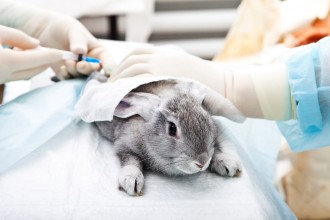
This week – April 18 to 24, 2016 is World Week For Animals In Laboratories.
What does that mean?
Although they are usually hidden from the public view, animals in laboratories suffer by the millions each and every year. In 2013, (the latest year for which there are data), there were 3,023,184 animals used in research, teaching and testing as reported to the CCAC (Canadian Council on Animal Care)
World Week For Animals in Laboratories is designed to raise awareness about animal testing and to promote humane research – without harming animals
Table 1: Number of animals used at CCAC-certified institutions by animal type (2013)
ANIMAL TYPE NUMBER OF ANIMALS
Mice 1,233,196 Fish 970,969 Rats 228,143 Birds 192,394 Cattle 171,394 Amphibians 82,542 Pigs 37,913 Other animals 35,430 Guinea pigs 20,687 Dogs 14,685 Other rodents 10,738 Reptiles 8,458 Cats 6,833 Rabbits 5,733 Non-human primates 4,069
Total 3,023,184
Source: These represent the number of animals used for research, teaching and testing in 2013
*from Canadian Council On Animal Care (CCAC) www.ccac.ca/…/facts-and-fig…/animal-data/stats-aud/data-2013
As well, the CCAC breaks down the dog and cat numbers as to their source. “Purpose bred” animals are purchased from animal supply facilities and are bred specifically to be experimented on. They have had no lives outside of the laboratory. “Random source” animals are from pounds and shelters – former companion animals that were picked up as strays, or surrendered by their people. Most of these random source dogs and cats are from Ontario and Quebec.
cats purpose bred 893 cats random source 5892
dogs purpose bred 4520 dogs random source 10096
Animal Alliance of Canada is a federally incorporated, primarily volunteer organization. Our focus is to achieve long-term legislated animal and environmental protection and we have several active campaigns that focus on animals in research.
Our “Be Cruelty-Free” campaign is fighting to end animal testing for cosmetics in Canada. Join Animal Alliance of Canada and Humane Society International in urging the Government of Canada to end cosmetics animal testing forever.
Every year rabbits, guinea pigs, rats, mice, and other animals undergo painful procedures in research and testing laboratories. Their entire lives are spent in isolation — and their suffering is endless.
Besides educating yourself and shopping cruelty-free (please visit AnimalAlliance.ca for more information), we need to keep the pressure on the Honourable Jane Philpott, Minister of Health, to bring in legislation banning the use of cosmetic testing on animals. So please, mail and call her.
Hand-written letters are best but you can also print our sign-on letter.
The Honourable Jane Philpott
Minister of Health
House of Commons
Ottawa, ON K1A 0A6
T/ 613-992-3640
F/ 613-992-3642
Email: jane.philpott@parl.gc.ca
Pound seizure is the sale or release of dogs and cats from pounds or shelters to a research, testing, or educational laboratories. The Ontario Animals For Research Act makes this practice the law. Ontario is now the only province, in all of Canada, where pound seizure is mandated.
Ontario and Quebec are the largest users of dogs and cats for experimental purposes. Please help us amend the Animals for Research Act to ban the use of lost pets from Ontario municipal pounds and shelters from animal experimentation and to ban the import of lost, stray or abandoned pets for experimentation from Quebec and other provinces in Canada.
Make sure that your pets wear identification and that their microchip information is up to date. Know where lost pets are sheltered in your community and how long you have to reclaim them before they are put up for adoption, sold to research or euthanized.
Contact the Premiers and speak out! We need to keep the pressure on the Honourable Kathleen Wynne, Premier of Ontario, and the Honourable Philippe Couillard, Premier of Quebec, to bring in legislation banning the use of lost pets in research. So please, mail and call them. Hand-written letters are best but you can also print our sign on letter.
Honourable Kathleen Wynne
Premier of Ontario
Queen’s Park
Toronto, Ontario M7A 1A1
T/ 416-325-1941
F/ 416-325-9895
Email: kwynne.mpp@liberal.ola.org
Honourable Philippe Couillard
Province de Québec
Conseil Exécutif, Édifice Honoré Mercier
835, boul. René-Lévesque est, 3e étage,
Québec, QC G1A 1B4
T/ 418-643-5321
F/ 418-643-3924
Email: Philippe.Couillard@plq.org
If animals are important to you, and if these issues are of interest, you can get more information by visiting AnimalAlliance.ca
And don’t forget to sign up for our mailing list – that way you will get the latest news and action alerts. Thanks!